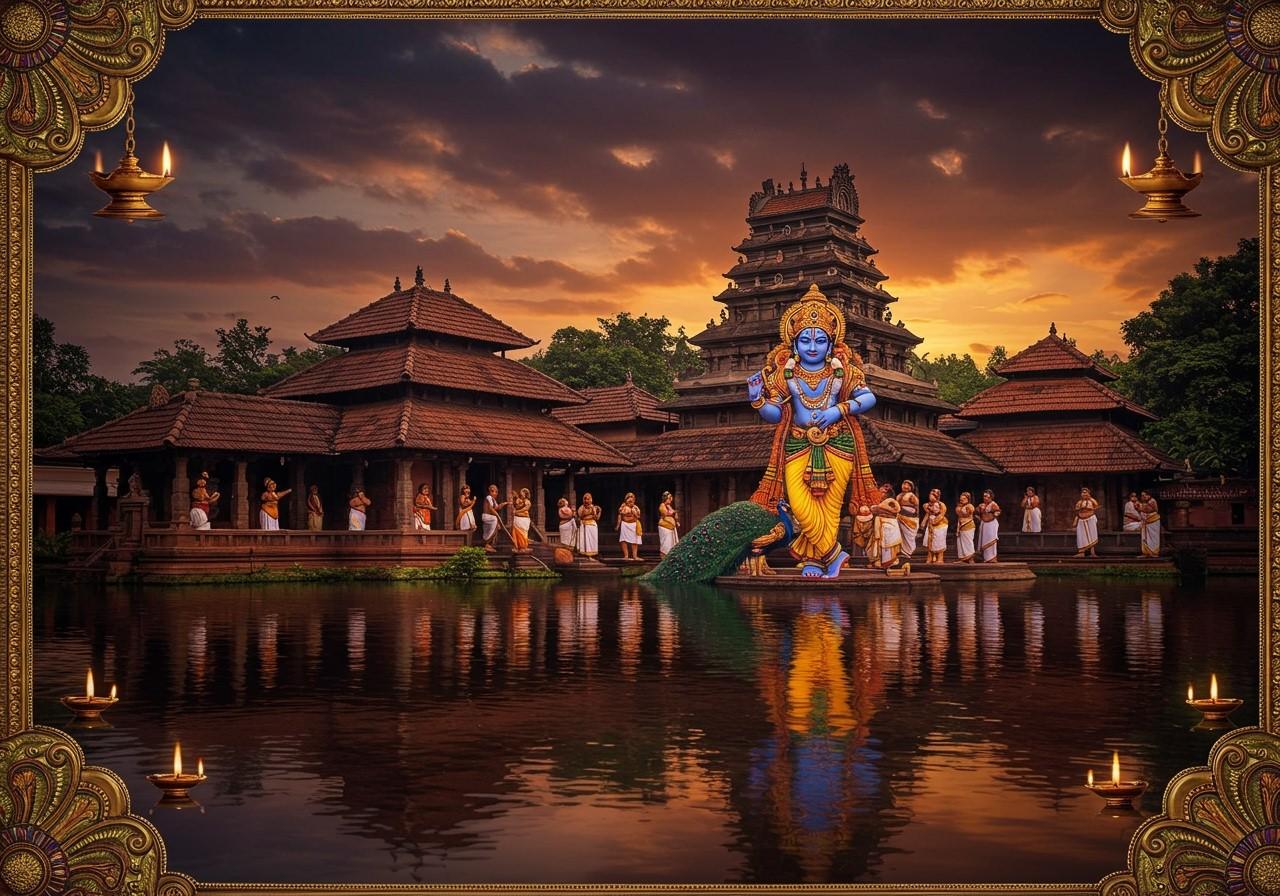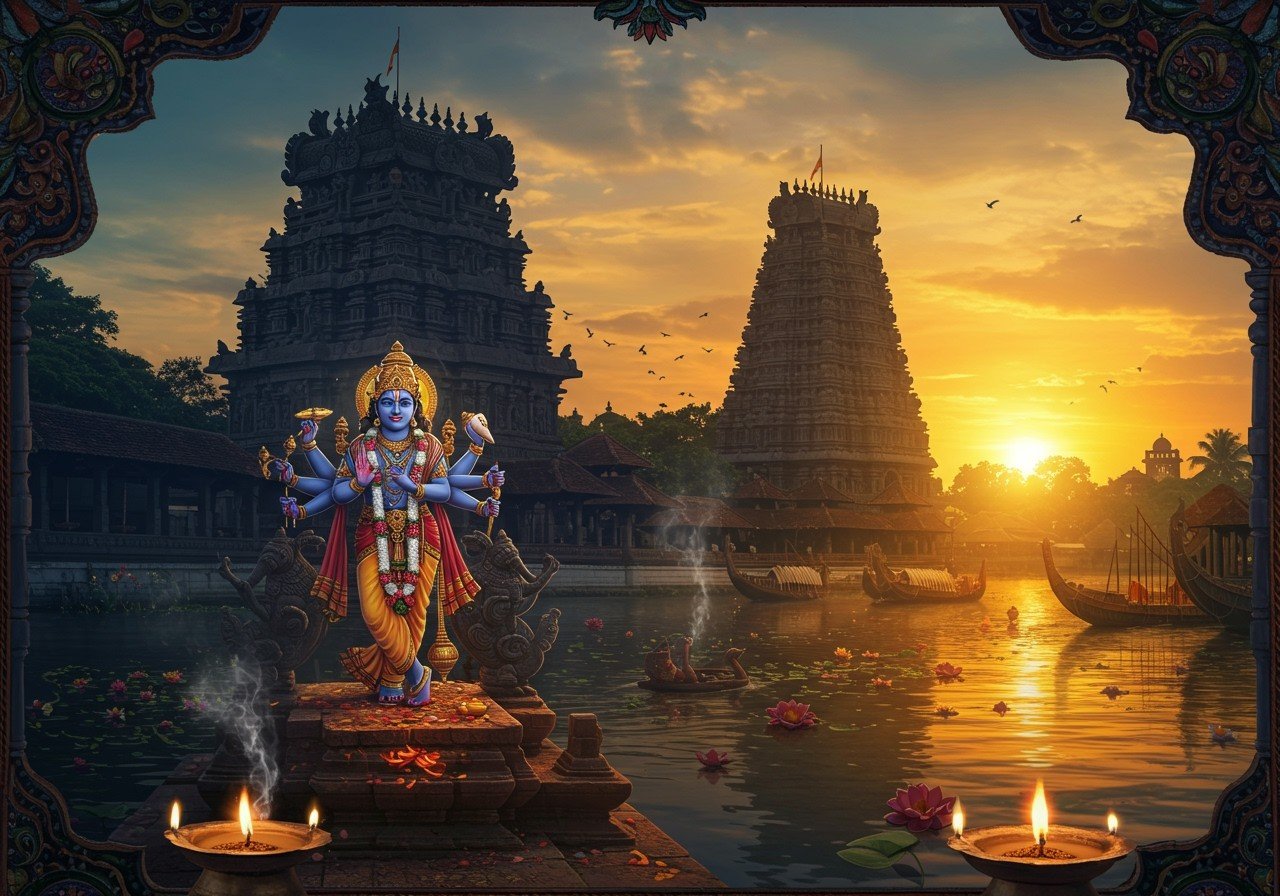
The Aranmula Kannadi, more than just a mirror, embodies Kerala’s rich artistic legacy. Hailing from the village of Aranmula, this unique metal-alloy mirror holds deep cultural significance, gracing rituals, ceremonies, and homes as a symbol of prosperity and tradition. Unlike ordinary mirrors, the Aranmula Kannadi offers a distortion-free reflection, a testament to its unique construction and the skilled hands that craft it. Its recognition with a Geographical Indication (GI) tag in 2004-05 underscores its authenticity and the importance of preserving its heritage.
The Story Behind the Shine
The origins of the Aranmula Kannadi are intertwined with the revered Aranmula Parthasarathy Temple. Legend has it that centuries ago, a royal chief commissioned families of artisans and craftsmen from Tirunelveli, Tamil Nadu, to create these special mirrors for the temple. Another captivating narrative tells of a cracked crown made for the deity, prompting the king to summon a master bronze smith. The smith, working tirelessly, fashioned a new crown of copper and tin that shone with an unexpected brilliance, possessing the remarkable quality of reflection. This serendipitous discovery, as the stories suggest, may have led to the creation of the Aranmula Kannadi.
Adding another layer to its rich history, a group of Vishwa Brahmana families, renowned bronze craftsmen, migrated to Aranmula from Sankarakoil, Thiruvallur, Tamil Nadu, centuries ago at the behest of King Anizham Thirunal Marthanda Varma of Travancore. This migration further solidified the tradition of crafting these unique mirrors in Aranmula, passing down the craft through generations. The existence of metal mirrors during the Vedic period, as some historians believe, suggests that the concept of the Aranmula Kannadi may have ancient roots.
More Than Meets the Eye: Cultural Significance
In Kerala, the Aranmula Kannadi is more than just a reflective surface; it’s a symbol of prosperity, luck, and protection, deeply embedded in the cultural fabric of the region. Considered one of the eight auspicious items, the “ashtamangalyam,” it plays a vital role in weddings, signifying a bright future for the newlyweds. Its presence in homes is believed to bring good fortune and ward off negative energies, making it a cherished possession passed down through generations.

The Alchemy of Aranmula Kannadi: Craftsmanship
The magic of the Aranmula Kannadi lies in its unique composition and meticulous crafting process, a closely guarded secret passed down through generations of a single family in Aranmula. While metallurgists believe the alloy primarily consists of copper and tin, forming a type of speculum metal or bronze mirror, some whisper of undisclosed metals that enhance its reflective properties.
The creation of each mirror is a labor of love, a testament to the artisan’s skill and dedication. It begins with carefully measured pieces of copper and tin, sometimes with zinc, melted in a wrought iron crucible. The molten metal is then poured onto a flat surface, allowed to cool, and broken into pieces. These pieces are meticulously inspected before being remelted and poured into preheated molds. After cooling, the mold is broken, revealing the nascent mirror, which is then checked for imperfections.

The polishing process is where the true artistry comes into play. Using a paste of rice bran mixed with oil extracted from the seeds of the maroṭṭi tree (Hydnocarpus pentandrus), the artisan painstakingly polishes the mirror’s surface. The final touch involves polishing with velvet cloth, bringing out the mirror’s unique, front-surface reflection. This distinctive feature sets it apart from ordinary glass mirrors, as the reflection occurs on the upper surface, creating a seamless connection between the mirror and the reflected image. This intricate process is currently practiced by only about nineteen craftsmen, highlighting the rarity and exclusivity of each Aranmula Kannadi.
Aranmula Kannadi in the Modern World
In today’s world, the Aranmula Kannadi stands as a bridge between tradition and modernity. Its timeless appeal continues to captivate art lovers and collectors, drawn to its unique craftsmanship and cultural significance. Online platforms, like poojn.in, have made these exquisite mirrors more accessible, allowing people worldwide to appreciate and own a piece of Indian heritage. For those seeking authentic cultural products, poojn.in offers a curated selection of Aranmula Kannadis, ensuring a genuine piece of art for your home. You can also explore other culturally significant items like GI tagged items on poojn.in.

Visiting Aranmula offers a unique opportunity to witness the crafting process firsthand, connecting with the artisans and their traditions. The enduring popularity of the Aranmula Kannadi reflects a growing appreciation for sustainable and ethical craftsmanship, ensuring its relevance in the modern world. Whether adorning a home, gracing a wedding ceremony, or becoming a treasured heirloom, the Aranmula Kannadi continues to reflect the rich heritage and artistic brilliance of Kerala.
Common Questions About the Aranmula Kannadi
Many people wonder about the specifics of the Aranmula Kannadi. It’s a special type of mirror, handcrafted in Kerala, India. What sets it apart is its composition: a unique metal alloy, unlike the glass used in common mirrors. This alloy, primarily a blend of copper and tin, is what gives the Aranmula Kannadi its distinctive reflective quality. People are often curious about its special properties. The front-surface reflection creates an incredibly clear and precise image, free from the distortions sometimes seen in regular mirrors. And of course, there’s the question of its origins. The Aranmula Kannadi is deeply rooted in Kerala’s cultural heritage. The crafting process, passed down through generations of skilled artisans, involves carefully melting and molding the metal alloy before meticulously polishing it to perfection. For those interested in acquiring one, you can find authentic Aranmula Kannadis online at poojn.in and other reputable platforms. Its revered status in Kerala comes from its symbolic meaning of good luck and prosperity, often used in traditional ceremonies and given as a cherished gift. Panch Ratna products can also add a touch of tradition to your home, available at poojn.in.


